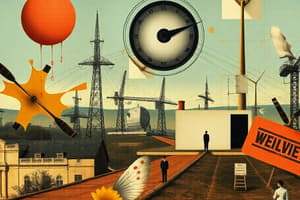Podcast
Questions and Answers
What did Geert Wilders claim about culture in his statement?
What did Geert Wilders claim about culture in his statement?
- Cultural diversity should be embraced.
- The best culture is determined by success.
- All cultures deserve equal respect.
- His culture is superior to others. (correct)
In what context did Geert Wilders make his statement about culture?
In what context did Geert Wilders make his statement about culture?
- At a university seminar.
- During a political debate.
- During a cultural festival.
- At a Pegida meeting. (correct)
How does Geert Wilders' statement reflect his views on cultural identity?
How does Geert Wilders' statement reflect his views on cultural identity?
- He believes all cultures have equal value.
- He encourages cultural exchange and dialogue.
- He promotes the idea of cultural assimilation.
- He supports the idea of cultural superiority. (correct)
Which of the following best describes the reaction that Geert Wilders' statement might evoke?
Which of the following best describes the reaction that Geert Wilders' statement might evoke?
What is a potential consequence of claiming one culture is superior?
What is a potential consequence of claiming one culture is superior?
Flashcards
Immigrant
Immigrant
A person who is from a different country than where they currently live.
Expatriate
Expatriate
A person who has left their own country and is living in another country, but who is not a citizen of that country.
Ethnocentrism
Ethnocentrism
The belief that one's own culture is superior to others.
Culture
Culture
Signup and view all the flashcards
Acculturation
Acculturation
Signup and view all the flashcards
Study Notes
Key Concepts in the Social Sciences
- Course: CM1013
- Lecturer: Yosha Wijngaarden
- Institution: Erasmus University Rotterdam
Today's Key Concepts: Society
- Evolution of societies
- Classic explanations of how societies work (Marx, Durkheim, Weber)
- Evolution of societies, continued
Today's Key Concepts: Culture
- Components of culture
- Culture and globalization
- How to apply culture in media and communication?
Societies
- Societies are groups of people interacting in a defined space and sharing culture.
- Map of the world in 1000 BCE, showing different societal types (e.g., hunter-gatherers, pastoralists, farmers, state societies).
- Areas of bronze working and iron working shown on the map.
Evolution of Societies
- 1- Hunting and gathering societies
- 2- Horticultural and pastoral societies
- 3- Agrarian societies
- 4- Industrial societies
- 5- Post-industrial societies
Theories about Modern Society
- Theory: statement about how and why facts are related
- Focus today: dead white Europeans (Marx, Weber, Durkheim) - foundational to social science thinking.
- Coming weeks: more inclusive perspectives.
Explaining Modern Society: Marx
- Materialist view on society: Superstructure (media, culture) determined by infrastructure (production).
- Class conflict between bourgeoisie and proletariat (surplus appropriation).
- Antagonism between classes over wealth and power distribution in society.
- Modern society (capitalism) is a product of changing relations of production.
- Workers are alienated from the act of working, the product of their work, and their human potential.
- Class consciousness (recognition of unity as a class).
- Teleological theory: Alienation and class consciousness lead to revolution and a better, equal society.
- Class conflict and social change
Explaining Modern Society: Max Weber
- Societies change due to human ideas and values, influenced by the Protestant ethic (God shows grace through material profit).
- Rationalization: historical change from tradition to rationality as the dominant mode of thought.
- Rise of bureaucracies: truly rational organisations.
- McDonaldization of societies.
Explaining Modern Society: Emile Durkheim
- Society is more than the sum of its parts.
- Society is a complex system, interconnected parts that promote solidarity and stability.
- Structure & function (e.g., crime is a fact affecting morality, not pathological).
- Transition from mechanical solidarity to organic solidarity.
- Concept of anomie (lack of moral guidance in modern society).
Development of Societies, continued
- Are societies becoming 'better'?
- Different types of societies coexist on a national and global scale.
- Evolution doesn't necessarily mean improvement.
- Critique of Enlightenment
- Zygmunt Bauman on rational organization: Modernity and Holocaust.
- Increasing interconnectedness of societies.
- Strong effects on culture.
How to Apply Culture to Media and Communication
- How do campaigns draw on existing symbols?
- How do cultures affect communication between individuals?
- How do norms affect student-teacher interactions?
- How do cultures influence the reception of television in different parts of the world?
- How does the concept of "neurodiversity" affect autism advocacy?
Key Concepts for Today
- Societies and development (Marx, Weber, Durkheim perspectives)
- Culture, components, globalization, and diversity
- (ethnocentrism, Cultural relativism)
Key Concepts Next Week
- Organizations and microsociology
- Chapter 6: Groups, Organizations, and the Rise of Network Society
- Chapter 7: Micro-sociology: The social construction of everyday life
Culture
- Cultures are "designs for living" incorporating values, beliefs, behaviour, practices, and material objects that constitute a culture.
- Culture includes material and intangible aspects.
- Practices include how people act and think.
- Culture is a social construct outside of individuality.
- It affects everyday life & experience.
Components of Culture
- Symbols
- Language
- Values
- Norms
- Material culture
Symbols
- Culture is a process of meaning-making.
- Symbols are constantly used/updated, leading to shifts in meaning.
Language
- Language is the primary source of cultural reproduction.
- Passed on through language & culture.
- Allows for accumulation of knowledge.
- Important source for social reproduction/exclusion (e.g., admission & dialects).
Values and Beliefs
- Values: Shared beliefs about what's good/bad, worth pursuing/avoiding.
- Beliefs: Specific, shared beliefs about reality.
Inglehart & Maslow
- Post-industrial societies - post-materialism?
- Maslow's Hierarchy of Needs
Norms
- Translation of general values into concrete rules of conduct.
- Expectations/rules to regulate people's behaviour.
- Some are universal, others context-bound.
Are Cultures Now Global?
- Increase in contact between different cultures.
- Global flows (economy, communication, migration).
- Cultural hybridization
- Uneven access to global flows.
- Specific consumer goods & mass culture impacting meaning.
Dealing with Different Cultures
- Ethnocentrism: judging cultures by another's standards.
- Cultural relativism: judging cultures on their own terms.
- Universal values possible? Validity of practices.
Additional Notes
Studying That Suits You
Use AI to generate personalized quizzes and flashcards to suit your learning preferences.




